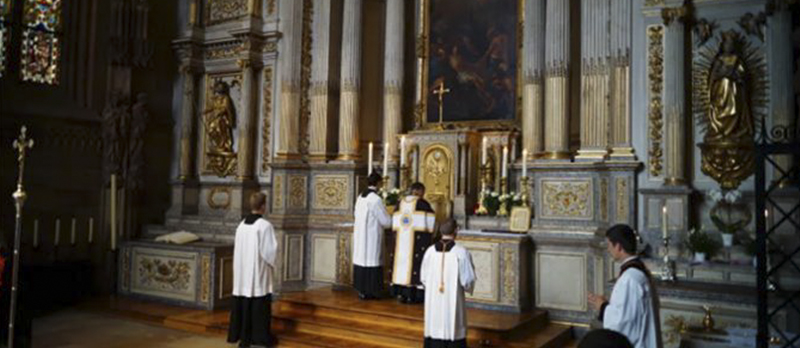"The experience of our members is that hostility to the old Mass is found above all in the older generation age of bishops and senior clergy. Seminary rectors, shrine custodians, and bishops have become steadily more friendly as time has gone on…"
September 15, 2022 Alberto Carosa
The Foederatio Internationalis Una Voce (FIUV) and the UK based Latin Mass Society (LMS) are both presided over by British writer and philosopher Joseph Shaw. The Latin Mass Society is undoubtedly the foremost organisation involved with the Traditional Mass in England and Wales.
In this interview, he presents FIUV, a founding member of CISP (Coetus Internationalis Summorum Pontificum), the umbrella organisation responsible for the annual pilgrimage to Rome of the Summorum Pontificum faithful.
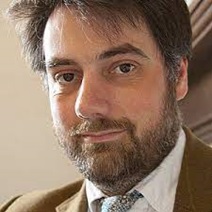 CWR: You were elected president of FIUV in October 2021; could you briefly present to us this international organization?
CWR: You were elected president of FIUV in October 2021; could you briefly present to us this international organization?
Joseph Shaw: FIUV was founded in 1965 by the six first national associations of lay Catholics who wished to preserve the ancient Roman Rite. It was established to represent the interests of our members to the Holy See. The FIUV now has around 40 members, from all over Europe and North America, and increasingly from South America, Asia, and Africa. The Federation holds meetings in Rome every two years.
We have been led by some very distinguished Presidents, notably our founding President, Eric de Saventhem, and his successor, the prolific writer Michael Davies. Besides Mr Davies, who died in 2004, three other FIUV Presidents have been LMS members: Leo Darroch, Jamie Bogle, and at the time of writing the LMS Chairman, myself, Joseph Shaw.
Our Council, which assists and advises the President and Officers, includes Catholics from all over the world, from the Far East to Mexico, and from Germany to South Africa.
CWR: And what is your relationship with Rome?
Joseph Shaw: We firmly believe in the importance of what happens in Rome: not only official acts of the Holy Father and the Curia, but the example of Rome. FIUV and CISP (Coetus Internationalis Summorum Pontificum) in conjunction with the LMS over the years widened the possibilities for the celebration of the Traditional Mass in St Peter’s, which at one time was impossible, and then possible only in one chapel in the crypt.
Thus, the CISP has been able to secure the use of the most prestigious chapel of the upper basilica: the Chapel of the Throne. This has tremendous and undeniable symbolic significance, indicating the legitimacy of this Mass and its practical toleration by Pope Francis, even after Traditionis custodes. The continuation of the work with and of the CISP is of the greatest importance, therefore, and we are pleased to unite our efforts with those of the Coetus for this end.
CWR: What are other FIUV’s main purposes and initiatives?
Joseph Shaw: FIUV has the immensely important role of interceding on behalf of Catholics ‘attached to the former liturgical traditions’ from all over the world. Our Officers regularly travel to Rome to meet officials of the Roman Curia, journalists, diplomats, and others, to seek to understand attitudes to the ancient Mass, to ensure our interlocutors—whether inclined to be friendly or hostile—are well informed about the movement, and to represent our members needs and concerns.
But whereas the LMS and other organisations can make their own representations to Vatican departments on matters pertaining to England and Wales, FIUV is able to present a global picture thanks to its international network of members.
A major project of the Federation in recent years have been the production of 33 short ‘Position Papers’ on different aspects of the Traditional Mass, now available as the book The Case for Liturgical Restoration (Angelico Press, 2019). The papers were produced in consultation with a team of experts from many different member associations.
Another project was the production of a report on the implementation of the Apostolic Letter Summorum Pontificum, which involved detailed information from our members and other local contacts. We were able to present to the Congregation for the Doctrine of the Faith this report, with a summary and conclusions, which included details from more than 350 dioceses in 52 countries. This was delivered to coincide with information coming to the CDF from bishops around the world, on the same subject, in the summer of 2020.
Some of the work of the Federation involves meeting with senior clerics; other aspects of our work have involved historical scholarship and theological argumentation. But it is the experience of ordinary Catholics, the ‘simple faithful’, which motivates the Federation. The movement is alive today because the Mass itself has continued to inspire, to console, and to give strength to many thousands of people in every culture where the Latin Rite is to be found.
Each of us involved in the Federation is also involved in our local ‘Una Voce’ group or ‘Latin Mass Society’, and we can see, in others and in ourselves, the continuing relevance of this liturgy, which can reach such a wide range of people.
CWR: What is your view of the current situation of the Church regarding the traditional Mass?
Joseph Shaw: The situation of the ancient Mass following Traditionis custodes and subsequent documents is mixed around the world, but this must itself represent a grave disappointment for those who hoped that this Mass would be rapidly wiped out.
The experience of our members is that hostility to the old Mass is found above all in the older generation age of bishops and senior clergy. Seminary rectors, shrine custodians, and bishops have become steadily more friendly as time has gone on, and ongoing hostility is sometimes the result of pressure from the very oldest generation of priests. While there are exceptions to this principle, it is clear that in ten years’ time the typical bishop and senior cleric will be much more open-minded about the ancient Mass than he is today, just as he is today much more open-minded than his predecessors of ten years ago.
At the same time, younger clergy and young lay Catholics are often enthusiastic about the old Mass, and find it difficult to understand why it has been so neglected for the last fifty years. The longer-term, therefore, gives us grounds for hope.
(This article originally appeared in Catholic World Report, September 15th, 2022)
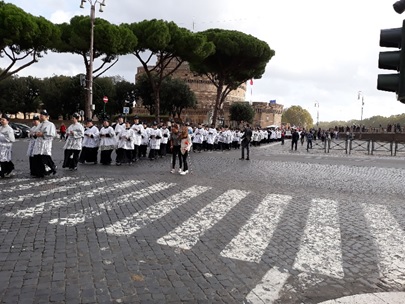
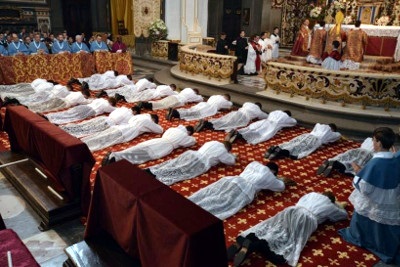
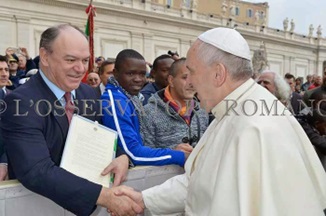
Former President, Colonel James Bogle of Gilmorehill, met Pope Francis during the visit of the FIUV Delegation to the Holy See in November 2014 and presented to the Holy Father a copy of a report on the emergence of young people in the traditional movement and at masses in the Roman rite. The report was presented in Spanish for the Holy Father.
(Source: http://www.fiuv.org/)
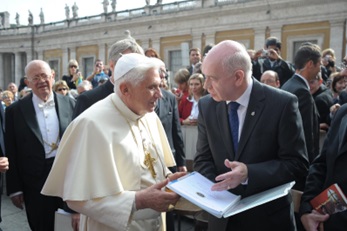
Two former president of FIUV: Leo Darroch (with Benedict XVI)
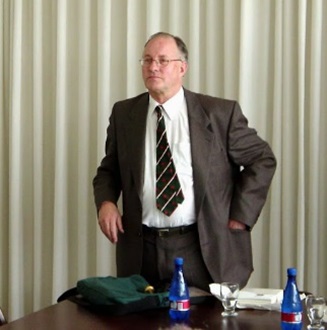
and the late Michael Davies
Back to the news


 OTHER
OTHER